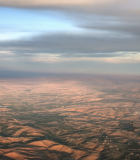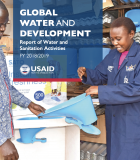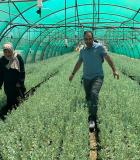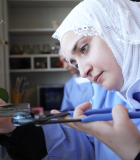Mafraq Wastewater Treatment Plant Upgrading
Mafraq is a provincial capital of 60,000 people in northern Jordan, about 15 km from the Syrian border. Mafraq’s existing wastewater treatment plant (WWTP), approximately 6 km north of city, utilizes stabilization ponds for wastewater treatment on a 37-hectare (ha) site. The plant began operation in 1988 and has consistently failed to meet Jordanian standards for stream (wadi) discharge. Equipment is seriously deteriorated, and inflowing sewage exceeds design capacity.
USAID supported the feasibility study and design for upgrading the existing wastewater treatment plant, and is currently funding construction and construction management to upgrade the plant to a capacity of 6,550 m3 per day through simple, low tech improvements. Treated water from the facility will be used mainly for irrigating farms in the vicinity of the plant. The plant is designed to serve the city of Mafraq until the year 2025.
Activity Description
- Construction of a new wastewater treatment plant to replace the old deteriorated plant to produce higher quality of effluent to be used for restricted irrigation.
- Phase 1 operation (partial operation) commenced on March 2014.
- Commissioning and operation of the treatment plant is expected to start on December, 2015.
- During construction, it was noticed that the flow received by the plant was lower than expected. In response to this, the existing main sewer line delivering raw sewage from Mafraq City to the plant was inspected and found to be deteriorated and 80 percent clogged. To prevent wastewater from penetrating into the ground and posing an environmental hazard, it was ultimately recommended to replace the sewage line.
USAID approved funding the construction of the sewer line. The negotiated construction cost of the sewer line was $5.6 million, raising the total contract amount to $29 million, of which USAID is providing $23.9 million and the Water Authority of Jordan (WAJ) is providing the remaining $5.1 million. The construction of the sewer line started on January 2015 and is expected to be completed by April 2016.
In order to store treated water for use in irrigation, and to avoid flooding in wadi areas and water wells downstream, WAJ awarded a JD 2.1 million contract for the construction of a reuse system (a 90,000 m3 storage pond, pump station and irrigation pipeline network). The reuse system contract commenced on January 2015 and is scheduled to be completed in October 2015.
Expected Outcomes
- New units within the plant that will meet treatment standards for discharge into wadis and limited reuse in agriculture until 2025.
- Lower demand for scarce groundwater resources due to alternative sources of irrigation water for local farmers.
- Reclaimed water available for reuse by locals, helping them generate income.
- Better quality treated wastewater for irrigation of farms.
- Measures to prevent ground water contamination.
- A lower level of odors emitted from the plant through use of anaerobic ponds.





